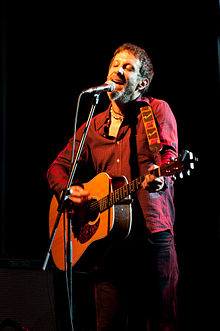Jonathan Donahue
Birth name Jonathan Daniel Donahue
Born May 6, 1966
Kingston, New York, United States
Genres
Alternative rock indie rock chamber pop neo-psychedelia
Occupation(s) Musician
Instruments Vocals, guitar
Jonathan Daniel Donahue (born May 6, 1966[1] in Kingston, New York) is an American rock musician. He has been an integral member of two of North America’s more influential indie/experimental bands of the 1990s; The Flaming Lips and Mercury Rev.
Donahue helped form Mercury Rev, along with vocalist/guitarist David Baker, bassist Dave Fridmann, guitarist and clarinetist Grasshopper (born Sean Mackowiak), rooster-tail bass flutist Suzanne Thorpe, and drummer Jimy Chambers, in the late 1980s as a source to create soundtracks to the members’ personal student films. The members were further encouraged to explore their talents by their mentor, minimalist composer and multimedia artist Tony Conrad.
Donahue also doubled as a concert promoter in Buffalo. After billing the Butthole Surfers and their opening act The Flaming Lips, Donahue joined the Flaming Lips around 1989/1990 as their guitar technician. He later joined the band as the full-time lead guitarist and played on the albums In a Priest Driven Ambulance and Hit to Death in the Future Head.
After being a member of The Flaming Lips for around two years, Donahue and The Flaming Lips frontman Wayne Coyne began to disagree over creative issues. Donahue left the band shortly after recording Hit to Death in the Future Head and was replaced by Oklahoma City guitarist Ronald Jones.
After leaving The Flaming Lips, Donahue returned to Buffalo and focused his time on reforming Mercury Rev. Jonathan Donahue was credited as having played the clarinet line for The Chemical Brothers’ 1997 cult hit “The Private Psychedelic Reel”, which has been the on and off closing song to their shows ever since. The clarinet part was actually played by former Mercury Rev reed player, Mark Marinoff.
An avid hockey player, Donahue grew up a big fan of the Montreal Canadiens during the 1970s and 1980s.
From Wikipedia, the free encyclopedia

